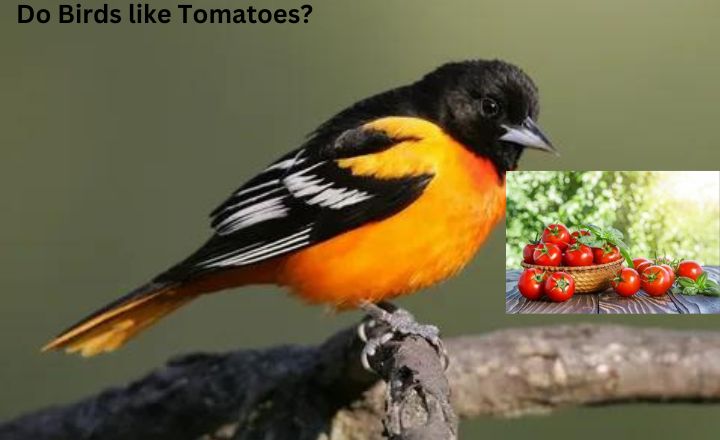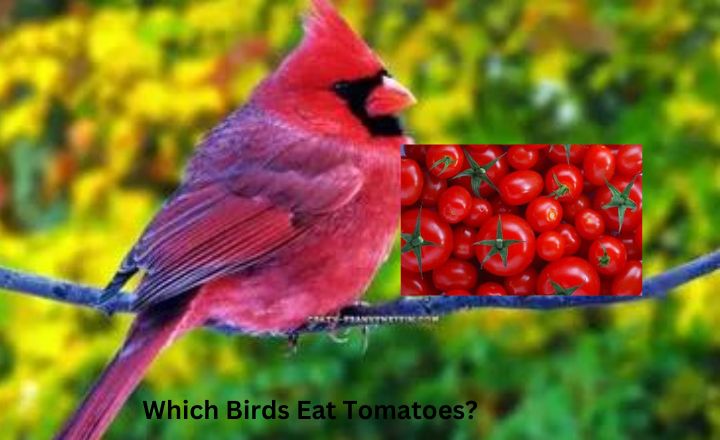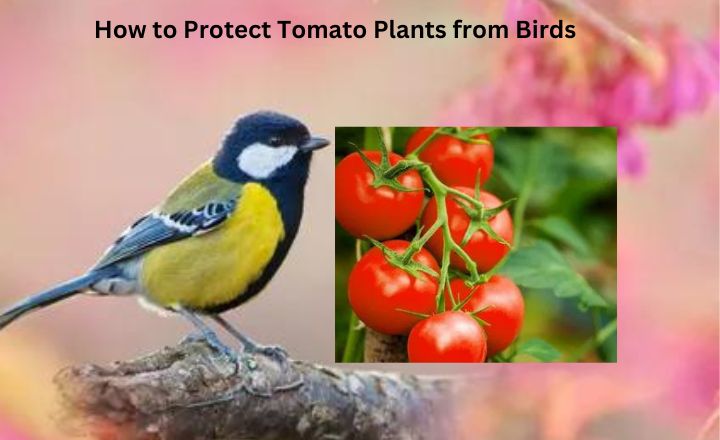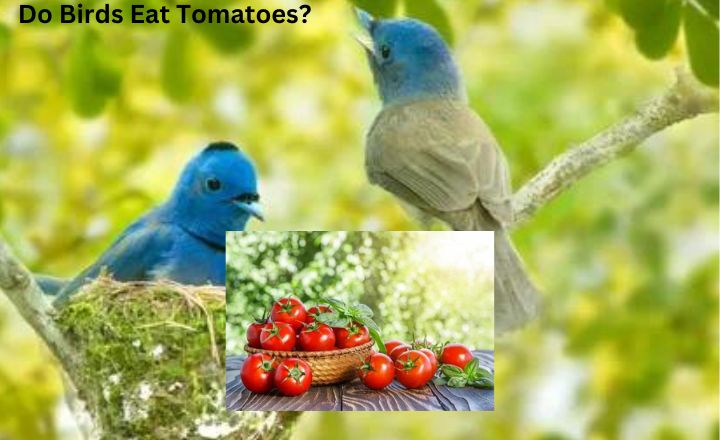Have you ever wondered, Do Birds Eat Tomatoes? It’s a question that might seem simple at first glance, but the answer is more complex than you might think. As gardeners and bird enthusiasts alike ponder over this intriguing topic, one can’t help but wonder: do birds really have a taste for these juicy red fruits? From tomato plants to cherry tomatoes, the world of avian dining habits is as vast and varied as the species themselves.
When it comes to exploring whether Birds Eat Tomatoes? we delve into a realm where nature’s creatures intersect with human cultivation. Some may argue that tomato plants are a delicacy for certain bird species, while others claim that only specific types of birds like tomatoes.
The mystery deepens as we consider if cardinals enjoy indulging in ripe tomatoes or if cherry tomatoes hold a special allure for our feathered friends. Join us on this fascinating journey through the culinary preferences of our avian companions and uncover the truth behind the age-old question: Do Birds Eat Tomatoes?
do birds like tomatoes

Birds are known to have diverse diets, but do birds eat tomatoes? It’s not uncommon to see birds pecking at fruits and vegetables in gardens. While some birds may try a nibble of a ripe tomato, others may not be as interested in this particular fruit. Cardinals, for example, are known to enjoy berries more than tomatoes.
It’s important to note that individual bird species have varying preferences when it comes to food. Tomato plants can also attract birds due to their colourful and appealing appearance. Some birds may pluck the ripe fruits from the vines while looking for seeds or insects hiding among the foliage.
If you’re keen on observing bird behaviour around tomato plants, consider setting up feeders with alternative bird-friendly foods nearby. This way, you can attract feathered visitors without sacrificing your precious tomatoes.
Are Tomatoes Safe for Birds?
Tomatoes are generally safe for birds to consume in moderation. While some bird species may show interest in tomatoes, it’s essential to consider the potential risks associated with feeding them this fruit. In nature, birds have a diverse diet that includes insects, seeds, and fruits; however, not all bird species are inclined to eat tomatoes.
When it comes to the question, Do Birds Eat Tomatoes? The answer is not a definitive yes or no. While some birds may peck at tomatoes or even nibble on them, it’s generally uncommon for birds to make tomatoes a staple part of their diet. In the wild, certain bird species like robins and cardinals may occasionally show interest in ripe tomatoes, but they are more likely to go for insects and seeds.
Do birds eat tomato plants? This is another interesting query that highlights the nuanced relationship between birds and tomato plants. While some birds might explore tomato plants out of curiosity or foraging instincts, they typically do not target them as their primary food source.
Gardeners must protect their tomato plants from birds by using netting or other deterrents if they notice excessive bird activity around their garden. Tomatoes contain solanine and tomatine, which can be harmful to birds if consumed in large quantities. How have Greggs prices changed? Let’s take a quick look.
Which Birds Eat Tomatoes?

The birds which eat tomatoes are given in the list.
- Mockingbirds – Mockingbirds also enjoy indulging in ripe tomatoes still on the vine, showing a preference for the fresh and juicy ones. One of the most common questions among gardeners is, Do birds eat tomatoes? It turns out that several bird species have a penchant for these juicy fruits.
- Cardinals – Cardinals are not the only birds that enjoy feasting on ripe tomatoes. Thrushes, such as robins and bluebirds, also have a penchant for these juicy fruits. It’s a fascinating sight to behold these birds pecking away at a cluster of cherry tomatoes in the garden, savouring every bite.
- Blue Jays—Blue Jays are among the most striking birds that enjoy indulging in tomato pieces. Surprisingly, these colorful feathered friends can be enticed to feast on tomatoes, whether from your hand or placed on a platform feeder. The curious behavior of Blue Jays toward tomatoes often sparks interest and joy for bird enthusiasts who witness their interactions with this popular fruit.
- Finches – American goldfinches, house finches, and other seed-eating finches enjoy tomato bits or pieces of ripe fruit. Do Birds Eat Tomatoes? While not a common food choice for most birds, some may peck at tomatoes occasionally.
- Orioles – Bird enthusiasts often wonder, Do birds eat tomatoes? The answer is a resounding yes! Birds like orioles, cardinals, and even robins are known to snack on tomatoes. While you may worry about them devouring your precious garden produce, it’s fascinating to observe these creatures enjoying the juicy fruit. Interestingly, Baltimore and orchard orioles are particularly fond of fruits like grapes and tomatoes; providing cut-up pieces in feeders can attract them with ease.
- Crows: Crows, known for being opportunistic feeders, have shown a penchant for ripe tomatoes in various settings. This behaviour highlights the adaptability of certain bird species when it comes to their dietary preference.
- Robins – Robins are one of the common bird species known to enjoy feasting on tomatoes. Whether plucked off the vine or left out as pieces for them, these red-breasted birds eagerly partake in this juicy fruit.
- Cedar Waxwings – Cedar Waxwings are known for their fondness of fruits, with tomatoes ranking high on their list of preferred foods. When asked Do birds eat tomatoes, it’s clear that these gregarious creatures definitely enjoy munching on this juicy fruit.
- Sparrows – Sparrows house and other sparrows will eat tomato pieces along with the other foods left in yards. While sparrows may not be the first birds that come to mind when you think of tomato consumption, they are indeed attracted to this juicy fruit.
- Doves – Doves, including mourning doves, are known to enjoy tomatoes as a supplement to their typical seed diet. Cardinals have been observed dining on tomatoes, adding colour and flair to their diet. When it comes to the query, Do Birds Eat Tomatoes? Various species exhibit a preference for this juicy fruit.
How to Protect Tomato Plants from Birds

To protect tomato plants from birds, consider using physical barriers such as bird netting or floating row covers. These can effectively deter birds from reaching the tomatoes. Making noise around the garden area can also help to scare off birds. Do birds eat butterflies? If you are interested in birds, my blog has all the info.
Another approach is to plant decoy crops that birds find less appealing near your tomato plants. This can distract them and reduce their interest in devouring your precious tomatoes. Moreover, installing reflective objects or devices like shiny tape or CDs near your tomato plants can create visual disturbances for birds, deterring them from landing and feasting on the fruits.
Some bird-friendly methods that you can use to protect Tomato Plants from Birds are given below.
- Netting: There are several effective methods to protect tomato plants from birds. One popular method is using bird netting to cover the plants. Make sure the netting is securely fastened to prevent birds from getting trapped inside. Multi-strand netting is recommended as it is safer for birds and still provides protection for your tomato plants.
- Reflective Objects: Birds can be a nuisance for tomato plants as they may eat the fruits or peck at the leaves, damaging the crop. To protect tomato plants from birds, one effective method is to use reflective objects such as old CDs, aluminium foil, or specially designed bird deterrents. These reflective objects create flashes of light and movement that can scare birds away from the tomato plants.
- Decoys: To protect tomato plants from birds, it is important first to understand whether birds are attracted to them for food. Birds do eat tomato plants, especially when the fruits start ripening. Using decoys like an owl or snake replicas can help deter birds by creating a sense of threat.
- Feeding Stations: To protect tomato plants from birds, it is important to understand their behaviour and preferences. By using the focus keywords Do birds eat tomato plants and How to protect tomato plants from birds, you can tailor your approach to deter them effectively. One strategy is to set up feeding stations with preferred foods away from your tomato plants. This will distract the birds and minimize their interest in your crops.
- Garden Layout: To protect your tomato plants from birds, strategically plant herbs or flowers that birds do not like around your garden. This can act as a natural deterrent and help keep the birds away from your precious tomato plants.
Listed below are some plants that can be grown near tomato plants to discourage birds:
- Marigolds – Do Birds Eat Tomatoes? When it comes to protecting your tomato plants from birds, marigolds can serve as effective allies in your garden. Birds have a strong aversion to the smell of marigolds, making them an excellent natural deterrent for these feathered intruders.
- Peppermint or Mint – Peppermint or mint plants can serve as a natural deterrent for birds that may pose a threat to your beloved tomato plants. The strong scent of peppermint acts as a powerful repellent, keeping these feathered creatures at bay and ensuring the safety of your garden. By strategically growing peppermint as a border around your tomatoes, you create a barrier that not only enhances the visual appeal of your garden but also acts as a practical solution to protect your tomato plants from being consumed by birds.
- Lavender— If you’re looking for a natural way to protect your precious tomatoes from pests, consider planting lavender nearby. Lavender’s strong scent is not attractive to birds, making it an effective companion plant for safeguarding your tomato crop. By strategically placing lavender bushes near your tomatoes, you can create a fragrant barrier that deters birds without the need for harmful repellents.
- Garlic – Growing garlic among or near tomato plants can be a strategic move for gardeners looking to deter birds from feasting on their tomato plants. Birds are known to avoid the pungent smell of garlic, making it an effective natural deterrent.
- Hot peppers – The intriguing phenomenon of birds avoiding hot peppers opens up a whole new dimension in the realm of gardening strategies. Beyond simply planting for aesthetics or taste preferences, this natural aversion sheds light on the intricate relationships between plants and animals in our ecosystems.
- Basil – Basil, with its strong aroma and pungent taste, serves as a natural deterrent for birds in your tomato garden. By strategically planting basil around the edges of your tomato plants, you create a protective barrier that wards off feathered pests. This simple yet effective method not only safeguards your precious produce but also adds a delightful touch of fragrance to your garden.
- Sage – Sage, with its aromatic leaves and earthy fragrance, plays a dual role in the garden – not only adding flavour to dishes but also serving as a natural deterrent for birds. By strategically planting sage as an edging plant for your tomato patch, you create a barrier that birds find unappealing. This simple yet effective method can help protect your precious tomato plants from being nibbled on by hungry avian visitors.
Are tomatoes safe for birds?
Yes, birds can safely eat ripe tomatoes in moderation.
Which birds eat tomatoes
Birds such as robins, thrushes, and starlings are known to eat tomatoes.
Do birds eat tomato plant leaves?
Yes, some birds may occasionally nibble on tomato plant leaves, but it is not a common part of their diet.
Do cranes eat tomatoes?
No, cranes do not typically eat tomatoes. They are carnivorous birds that primarily feed on fish, amphibians, insects, and small mammals.
Summary
In conclusion, the question Do Birds Eat Tomato plants? It is not a straightforward one to answer. While some bird species may be attracted to tomatoes and occasionally consume them, it is not a common part of their diet. The acidity and texture of tomatoes may deter many birds from eating them regularly. Gardeners need to take precautions if they want to protect their tomato plants from birds. By using bird netting or other deterrent methods, you can help ensure that your tomatoes remain safe from hungry avian visitors. Next time you’re in the garden, keep an eye out for any feathered friends eyeing your precious tomato crop!


